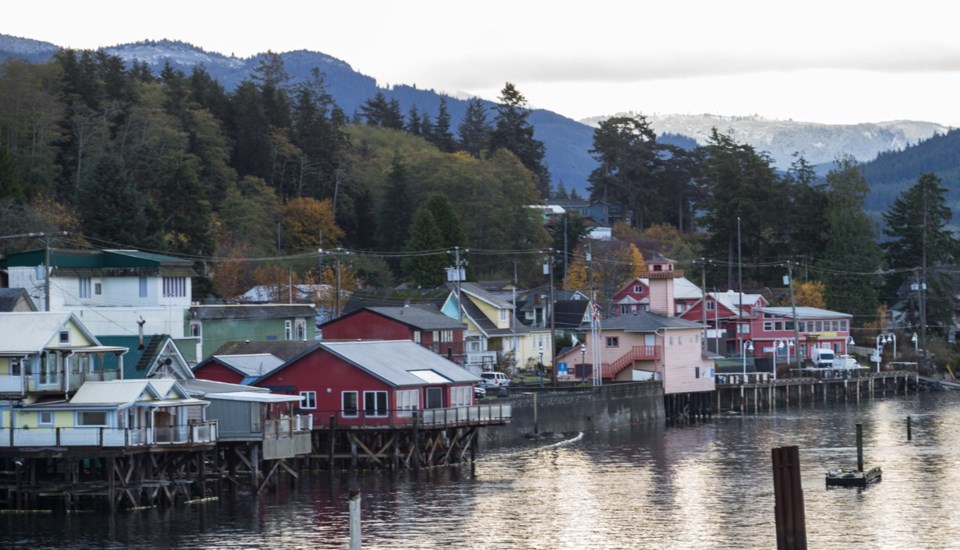Alert Bay Mayor Dennis Buchanan struggles to talk about the first COVID-19 death on Cormorant Island under his watch, and a local state of emergency.
“It’s tough,” says Buchanan, 72, stopping to compose himself. “This whole thing has an emotional impact on everybody.”
About three or four residents with COVID-19 have been transported off the island to Nanaimo Regional General Hospital, he said.
The death of a woman from Alert Bay was confirmed Friday by ‘Namgis First Nation elected Chief Don Svanvik and Buchanan. The woman had been transferred to Nanaimo Regional General Hospital, where she died.
On Saturday, provincial health officer Dr. Bonnie Henry acknowledged the “first death in one of B.C.’s First Nations communities,” calling it “a tragedy for all of us.”
“Our elders, particularly in our First Nations communities, are culture and history keepers,” said Henry. “When they become ill and when they die, we all lose.
“My thoughts are with her family and her entire community, as I recognize the tragic impact this has on all of them. It’s particularly a challenging time to not be able to come together physically in the normal way that we would to respect the customs that we have in communities at this time.”
The Village of Alert Bay — on Cormorant Island, a 40-minute ferry ride from Port McNeill — has a population of about 500 people. Cormorant Island’s population is about 1,500.
Any death is felt island-wide because of the size of the community, said Buchanan. “The loss of an individual affects the whole island.”
The town was thrown into action after Buchanan, who has lived on Cormorant Island since 1970 and is in his first term as mayor, contracted the virus despite never having left the island and taking what he thought were all the necessary precautions.
It was a wake-up call, said Buchanan, saying initially “everybody was sort of lackadaisical” about it. “On a remote island, I think most people thought it’s not going to get here.”
When Buchanan was tested, he had already been through the worst of what his doctor called a mild case. He was offered a bed in Nanaimo’s hospital, but at the time, he was not having trouble breathing.
“I was sleeping anywhere from 18 to 20 hours a day,” said Buchanan. “It knocks you down for sure. If that was a mild case I would certainly not want a heavier one.”
At first, doctors thought he had pneumonia, he said. “When the test came back positive for COVID-19, it was scary. It was upsetting to my children and my wife and myself, because you hear of people passing from COVID-19.”
On April 18, the Village of Alert Bay, in co-operation with the ‘Namgis First Nation and the Whe-La-La-U Area Council within the Emergency Operations Centre, declared a local state of emergency to address a cluster of cases on Cormorant Island.
Island Health, working with community leaders from Alert Bay and the ‘Namgis First Nation, local health-care providers and the First Nations Health Authority, is testing anyone with COVID-19 symptoms.
Last week, Island Health deployed additional staff to expand testing capacity to seven days a week, providing an additional physician to serve Cormorant Island. Anyone requiring hospitalization related to COVID-19 symptoms will be transferred off the island.
“If someone is tested positive for COVID-19 and there’s any doubt whatsoever about the possibility of them getting worse, they are being shipped out right away,” said Buchanan. “Unfortunately, of course, if people have underlying health conditions, it puts a whole other level to the seriousness of the situation.
“We have limited resources here, so having access to better critical care is important.”
Buchanan said the village, with the ‘Namgis First Nation, has rented rooms at hotels on Cormorant Island for those who, because of their living arrangements or other extenuating circumstances, can’t self-isolate.
Dr. Dan Cutfeet of the ‘Namgis Health Centre urged “anyone and everyone” with symptoms ranging from cough or fever to respiratory or stomach problems to get tested. “There’s no shame in this,” said Cutfeet. “This is a virus anyone can catch if exposed.”
The number of people infected on the island as part of the outbreak has not been revealed publicly for privacy reasons, said Buchanan.
Beyond the provincial state of emergency in place since March 18, the local state of emergency allowed officials on Cormorant Island to impose a nightly curfew and restrict passage on B.C. Ferries to essential travellers.
The local state of emergency can be lifted through the province, or when the number of new cases drops off, said Buchanan.
All decisions are being made collaboratively by local governments, First Nations, Emergency Management B.C. and Island Health, he said.
Buchanan offered kudos to front-line health workers, and said many more organizations have been needed to carry out the emergency measures. “We’ve had to make some tough decisions,” he said. “But we’re all in agreement to the decisions being made.”
The biggest challenge has been to convince people to stay at home and limit social contact, he said.
“We can get over this. We can beat it. But it takes a combined effort by everybody.”



